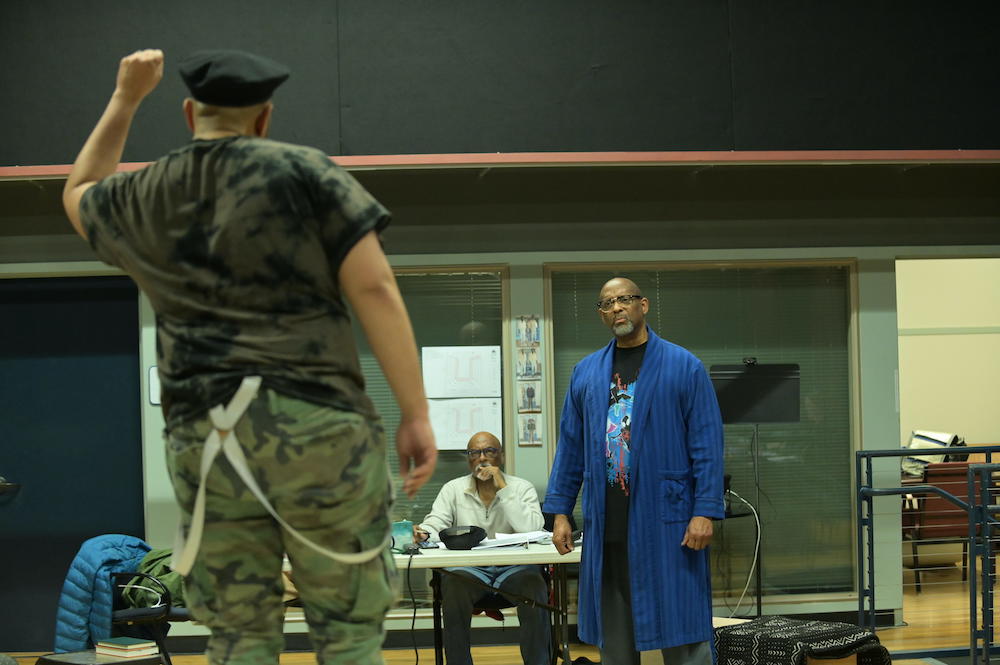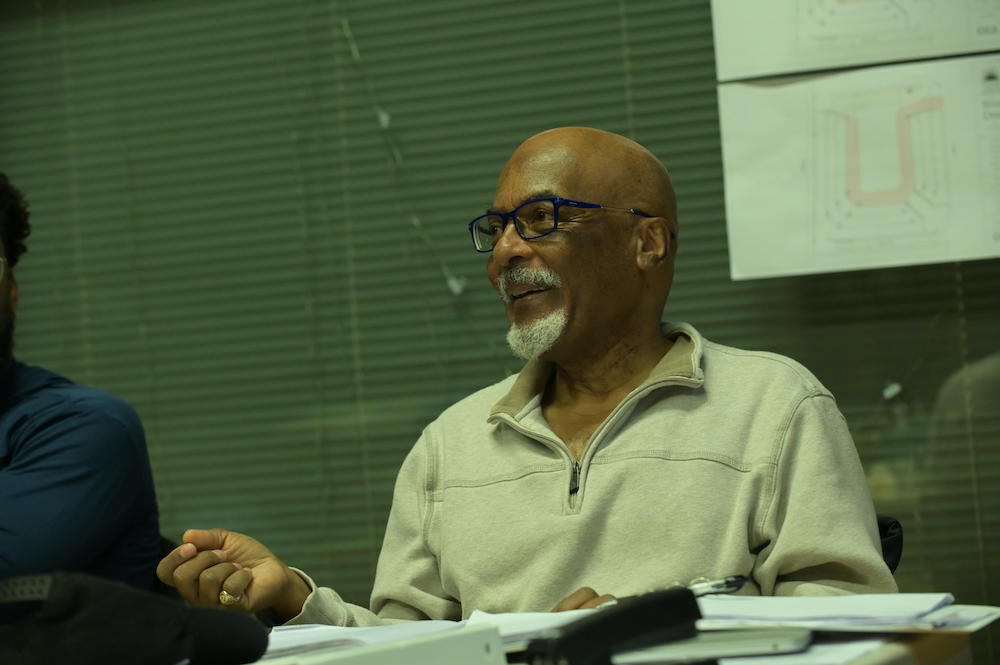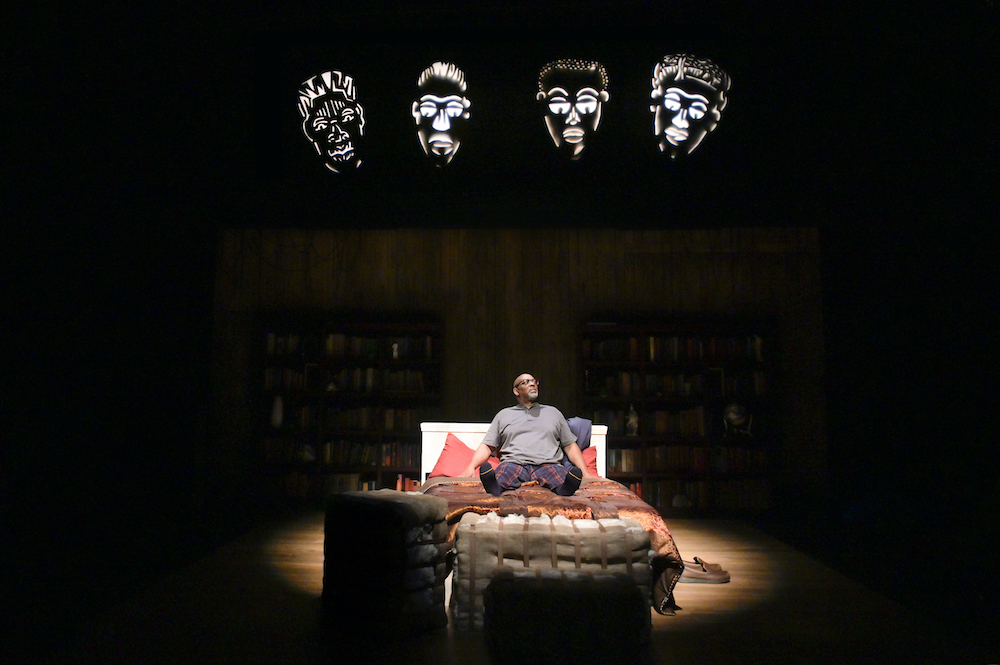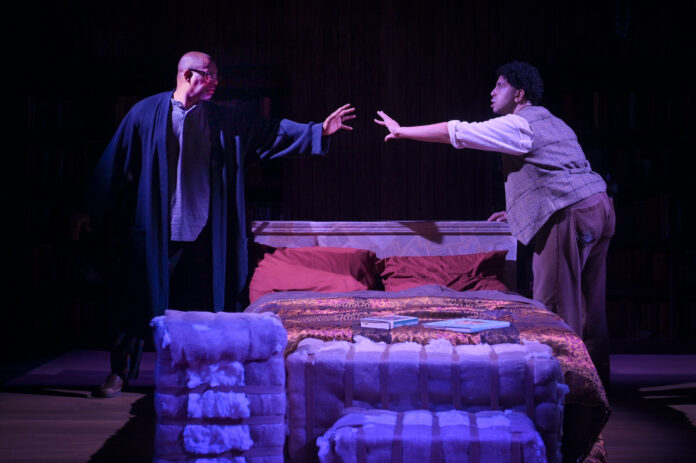Months before Blue Door (through May 19) opened at Berkeley’s Aurora Theatre Company, playwright Tanya Barfield’s 2006 story of a Black mathematics professor disconnected from three generations of his ancestors had already rattled and rewarded its two-person cast and director Darryl V. Jones. During their early rehearsals of the play, the three men shared personal stories about being Black men in America—a complicated, contradictory performance executed like an Olympic athlete on a slim beam.
“The work we did was rustic, basic,” Jones recalls in an interview with 48 Hills, “but the experiences are so familiar to us, as Black men, none of it was foreign. It was and is painful. We spent three days sharing our stories with each other and then asked, ‘Who is this play written for?’ Really, it’s for non-Black audience members so they will know the trauma, to know it’s still embedded in the DNA of this country.”

To enter Blue Door is to dive face first into its complexity. The character Lewis (Michale J. Asberry) is funny, assertive, while also so deeply in denial of his Blackness that his wife has left him over a failure to embrace his heritage. His counterparts, played by a single actor (James Mercer II), appear as several ghost-like relatives; Lewis’ great-grandfather, grandfather and his departed younger brother. They haunt Lewis during a torturous night filled with fevered dreams, soul-wrestling, African chants, Black spirituals, and the blues. Here, music is a sustaining force that upholds generations.
Jones brings to his position as director a complete garden of expertise that includes not only directing, writing plays, and acting, but composing and choreographing. He has a degree in vocal performance from Catholic University, and an MFA in directing from Boston University. At Aurora Theatre, Jones most recently directed Detroit ’67 and The Royale. Remarkably, Jones wrote all of the music for Blue Door in a single day.
“In the script it says, here are the lyrics, and everybody can create their own song based on the emotional needs and who these characters are,” he said. In Jones’ eyes, such connection resonates with the traditional role of art for Africans.
“They didn’t go the theater to sing and dance, it was just part of daily life, of prayer and spiritual life. Enslaved Africans brought that tradition to America, where it was grossly misinterpreted by slave owners who thought because they were singing, they were happy, content to be slaves,” he says. “But in fact, the music helped enslaved Africans overcome the inhumanity and tragic circumstances they were in.”

From this spiritual, musical outpouring of the soul of the people came Black spirituals, the blues, jazz. “Music was essential for them to overcome the insurmountable odds they faced,” he says. “Music was a spiritual lifeline. This music came from such a deep place I didn’t have to think. It was just there. It was simply channeled through me.”
Although the play takes place in 1995, Jones says it could be written about the politics and social reality of today. “Things still have not changed enough to where Black men are not targets for racial profiling. This play reveals that the racial matters in this country are on the surface more now than they’ve ever been. It might be the best thing to keep it in people’s faces and push for real change.”
Help us save local journalism!
Every tax-deductible donation helps us grow to cover the issues that mean the most to our community. Become a 48 Hills Hero and support the only daily progressive news source in the Bay Area.
Presenting Blue Door at a white theater company, no less (he acknowledges sincere actions the Aurora has taken to address industry inequities), has increased Jones’ awareness and pride in his ancestral history, forced him to question how he edits and makes himself smaller to fit into white spaces: “I’m Black and gay, so I had a double whammy. There was a lot to come to terms with in order to accept and celebrate who I am.”
Jones says descriptions of the play and even his own words risk making the production seem like a heavy, bitter pill and nothing more. Instead, amid the moments that crack the heart and deliver hammer blows to false shields covering up America’s historic racism, there is laughter, the wisdom of elders, a Black man’s movement to shed self-damaging behavior and claim his identity.

The play’s title is a reference to the Gullah belief that a door painted blue keeps away evil spirits called haints. As Lewis learns from his West African Adinkra ancestors, among the myths and traditions handed down through generations is a belief in sankofa. The spiritual term is symbolically represented by a mythic bird and translates to “go back and fetch it,” meaning, returning to one’s roots in order to go forward.
Jones says the sankofa bird is always present as he works on the play. He predicts that African Americans will leave Blue Door with a sense of empowerment. For non-Black audience members, he hopes they will be made more aware of the truth of false imprisonment, the school-to-prison pipeline, and systemic enslavement.
“Black men’s minds have been played with and traumatized and yet they still managed to rise,” he says. “This play illuminates and reveals that racial matters in this country are on the surface more than they’ve ever been. The truth rises and proclaims that racism cannot be sugar-coated any more.”
BLUE DOOR runs through May 19. Aurora Theatre Company, Berk. Tickets and more info here.






